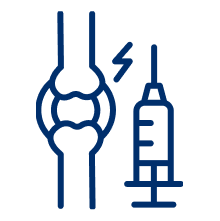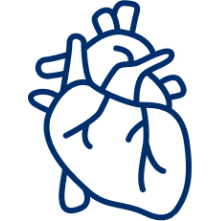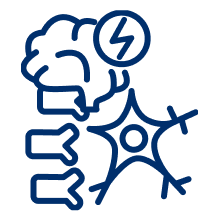


Ocular
muscles
Ocular muscles
- Blurry or double vision (diplopia)
- Eyelid drooping (ptosis)
- Eye muscle weakness
- Fatigability
Facial
muscles
Facial muscles
- Drooping
- Difficulty making facial expressions
- Poor cheek puff
- Drooling
Respiratory
muscles
Respiratory muscles
- Fatigability
- Pain holding head up
- Diaphragm weakness/difficulty breathing (exertional dyspnoea, orthopnoea, tachypnoea)
- Respiratory failure
Upper limb
muscles
Upper limb muscles
Arms
- Cramps
- Difficulty lifting
- Fatigability
- Fatigue
- Pain
- Spasms
- Weakness (e.g. picking things up)
Hands and fingers
- Dexterity
- Fine motor skills (e.g. grasping)
- Fatigability
- Loss of strength
- Spasms
Bulbar
muscles
Bulbar muscles
Voice and speech
- Fatigability
- Speech impairment (dysarthria)
- Voice quality/tone
- Hoarseness (dysphonia)
Chewing
- Difficulty chewing
- Jaw fatigue
- Weakness
Swallowing
- Difficulty swallowing (dysphagia)
- Choking
- Aspirating
- Vomiting
Axial
muscles
Axial muscles
- Fatigability
- Pain holding head up
- Weakness
- Neck flexion
- Neck extension/head drop
Back &
shoulder muscles
Back and shoulder muscles
- Fatigue
- Pain
- Spasms
- Weakness
Core
muscles
Core muscles
- Weakness
Lower
limb muscles
Lower limb muscles
Hips
- Fatigue
- Pain
- Spasms
- Weakness
Legs and feet
- Cramps
- Fatigability
- Fatigue
- Pain
- Spasms
- Twitches
- Weakness
Overall symptoms
Overall symptoms (location unspecified or described as general experience)
- Cognitive impairment (difficulty focusing, memory)
- Fatigability (worsening of impairment)
- Mental fatigue (too exhausted to think or mentally motivate)
- Pain (general muscle soreness or achiness)
- Physical fatigue (lack of energy, a feeling of depletion, or lethargy)
- Weakness (overall strength)
gMG symptoms are constantly in flux and external factors can trigger exacerbations:2,5,6
- Patients have reported that hot or humid weather triggers general physical fatigue and muscle weakness
- Some foods (due to their texture) can trigger difficulty chewing or swallowing
- Stress and anxiety have also been reported to exacerbate muscle weakness






healthcare professional


Signs that a patient is at risk of myasthenic crisis include:8
- Rapid worsening of primary myasthenic symptoms
- Rapid progression of bulbar symptoms
- Increasing dose of acetylcholinesterase inhibitors
- Tachypnoea
- Tachycardia
- Decreased forced vital capacity
- Respiratory infection
